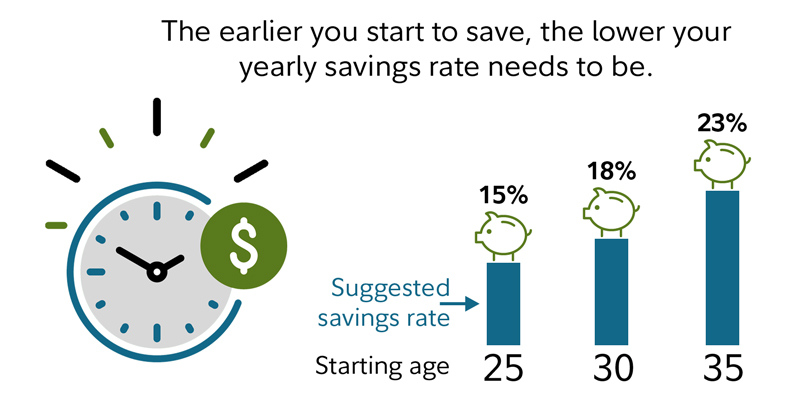It's crucial to mark savings milestones as they indicate your financial wellness and readiness for retirement. Knowing the standard amount people save at various ages can offer a helpful reference point when assessing ones finances. Even though everyone's situation is unique, normal saving patterns illuminate significant goals that individuals should strive for during different life phases. This article will look into the typical savings based on age, put them against individual financial aims, and provide understanding towards accomplishing your retirement savings ng targets.
The Importance of Tracking Savings by Age
To manage personal finances well and to make sure you are preparing properly for retirement, it is very important to keep an eye on your savings according to your age. A lot of individuals find it hard to know the right amount they should save at different stages in their lives. The average level of savings by age can be the useful standard way of knowing if you are saving faster than normal or if there's a need for any corrections. Also, it is crucial to mention that these averages can greatly differ depending on elements like income, spending patterns, and financial objectives.

Usually, individuals get advised to put aside some percent of their earnings every year. But there are notable differences in how people save based on whether they're in their 20s, 30s, 40s, or older. By knowing these numbers we can see more clearly the relationship between personal savings and retirement saving targets as well c as understand financial landmarks that should be reached over time.
- Track Your Progress: Regularly reviewing your savings will help you identify if you need to make adjustments to stay on target for your retirement goals.
- Factor in Life Events: Major life changes like marriage, children, or career shifts can significantly impact savings trends and should be accounted for.
Savings Trends in Your 20s
When you are in your 20s, concentrating on other monetary matters like student loans, rent, and career development is common. However, this d.gecade presents a perfect opportunity to begin establishing savings for future needs. Generally speaking, individuals who are in their 20s might have savings anywhere from $10,000 to $20,000. This varies based on their earnings and lifestyle decisions. Though these figures might appear small in comparison to older age groups, it is crucial to begin sooner and benefit from the compounding interest.
At this time, it is very important to pay attention to start emergency savings and also begin adding money into retirement accounts such as 401(k) or IRA. Starting these savings. Early can make a big difference in long-term readiness for retirement. A usual aim for people who are in their 20s is to save enough amount of money that cover living costs for three up to six months inside an emergency fund. During this stage, the main focus must be establishing a good financial base, settling all debts and regularly saving for objectives in the future.
- Start Early: The earlier you begin saving, the more your money can grow with compound interest, which can make a significant difference by retirement.
- Focus on Emergency Savings: Building an emergency fund should be a priority before making large investments or paying off other debts.
Savings Patterns in Your 30s
In the period of your 30s, usually targets for saving money become more clear. Many people concentrate on significant life events like buying a house, establishing a family, or enhancing their careers. The normal savings during this decade might be from $30,000 to $50,000. This range is an expression of people managing several financial aims at once, saving up for retirement years, repaying loans taken out for houses, and handling education expenses for kids.
This ten-year period is very essential for enhancing savings, especially for retirement purposes. Specialists suggest that you should strive to save a minimum of one year's income by the time you are 30 years old. Establishing goals for your retirement savings when in the age bracket of 30s requires being forward-thinking about making contributions towards long-term accounts and thinking about investment approaches that will increase your savings growth maximally. During this period, some people might decide to take more risks in investments, especially in the stock market. They do so because they have extra time to recover from any possible losses.
- Prioritize Retirement: Make sure you are contributing regularly to your retirement accounts, particularly if your employer offers matching contributions.
- Manage Debt: While saving for retirement, its crucial to keep an eye on debt, particularly high-interest loans like credit cards or personal loans.
Savings Goals in Your 40s
When you are in your 40s, the way to save money should be more purposeful because retirement aims to get clearer. At this phase, a lot of people might have saved up from $100,000 to $200,000 based on their income and manner of living. Now is also when putting aside cash for retirement becomes most important. People in their 40s feel a stronger urgency to save for retirement because there is less time left for growth when compared with younger ages.

This ten years is a period to reevaluate our retirement plan. Many advisors of finance recommend that people in their 40s should have a goal to save approximately three times what they earn every year by the time when they are 45. This can be reached with increasing contributions towards plans for retirement and confirming that savings are distributed across different options of investment. Moreover, settling debts like home loans and other credits should continue as a priority task. This is because having a solid financial base sets the preparation for a prosperous retirement time.
- Assess Retirement Needs: Review your retirement goals and adjust your savings contributions if necessary, ensuring that they reflect your current lifestyle and financial situation.
- Review Investment Strategies: Diversify your investment portfolio to balance risk and ensure steady growth of your savings.
Savings Expectations in Your 50s
When you reach your 50s, it is necessary to place retirement as a leading concern in your financial intentions. Usually, the common savings at this age fluctuate between $200,000 and $400,000. It is during this period that many people are confronted with the fact that they are only about ten years away from retiring. A lot of individuals in their 50s are at the prime stage for earning money, thus leading to more robust saving capabilities. This is especially true if they don't need to financially support children and have already settled most of their debts.
During this decade, people commonly target to enhance the contributions towards their retirement accounts. These may include 401(k)s, IRAs, and other savings methods. The primary aim should be accumulating sufficient wealth that can cover living costs after retiring with many individuals looking at saving six to eight times what they currently earn by the time they turn 60. It is crucial to ensure whether your present rate of savings is enough to maintain your preferred lifestyle post-retirement.
- Catch-Up Contributions: Take advantage of catch-up contributions allowed for retirement accounts after 50 to maximize your savings in the final stretch.
- Plan for Healthcare Costs: As healthcare needs increase with age, plan for potential medical expenses in retirement to ensure your savings can cover these costs.
Savings Targets in Your 60s and Beyond
At the age of 60, lots of people start planning for retirement and they need more savings to be financially secure. Usually, the average amount saved by this time ranges between $400,000 and $1 million but can vary based on a person's living style and financial choices. It is very important at this stage to properly distribute your retirement funds and have strategies ready so that you don't exhaust all your money after retiring.
People who are in their 60s should have a retirement savings target that ensures they can cover any known or unknown costs. Perfectly, people must strive to save an amount sufficient for the entire span of their retirement without giving up on the lifestyle they desire. Additionally, quite a few might change the approach of investment to become less risky and be more about saving money whilst confirming regular income sources like pension or social security are included within the plan for retiring.
- Prepare for Withdrawal Rates: Establish a sustainable withdrawal rate to ensure that savings last through retirement.
- Consult a Financial Advisor: Its important to seek expert advice on investment strategies and retirement income planning during this phase to ensure a secure retirement.
Conclusion
At each age stage achieving savings goals is very important for personal finance and retirement planning. Knowing the average amount of savings by age can be a good guide, helping people to check if they are progressing correctly towards their long-lasting financial aims. Whether you're in your 20s or near retirement in your 60s, it's crucial to set definite saving goals for retirement and keep regular additions to them, as this ensures the safety of your future finances. Modifying your habit of saving money as you progress in various phases of life can aid in confirming that you achieve your personal finance goals and enter the retirement period with assurance.











